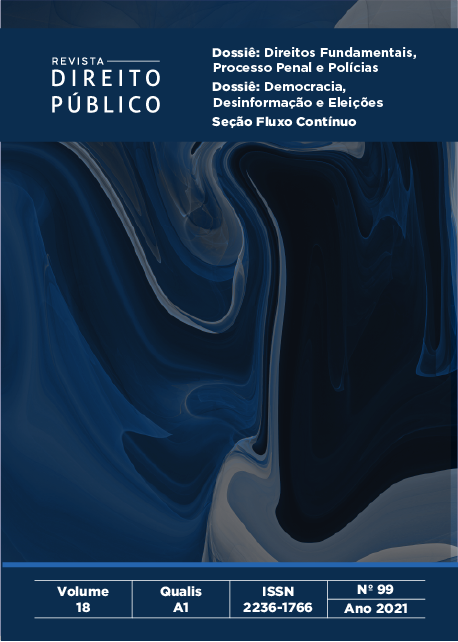Don’t Shoot the Message: Regulating Disinformation Beyond Content
DOI:
https://doi.org/10.11117/rdp.v18i99.6057Palavras-chave:
Disinformation, regulation, regulatory strategies, fake news, digital platforms.Resumo
This paper approaches regulatory strategies against disinformation with two main goals: (i) exploring the policies recently implemented in different legal contexts to provide insight into both the risks they pose to free speech and their potential to address the rationales that motivated them, and (ii) to do so by bridging policy debates and recent social and communications studies findings on disinformation. An interdisciplinary theoretical framework informs both the paper’s scope (anchored on understandings of regulatory strategies and of disinformation) and the analysis of the legitimate motivations for states to establish statutory regulation that aims at disinformation. Departing from this analysis, I suggest an organisation of recently implemented and proposed policies into three groups based on their regulatory target: content, data, and structure. Combining the analysis of these three types of policies with the theoretical framework, I will argue that, in the realm of statutory regulation, state action is better off targeted at data or structure, as aiming at content represents disproportional risks to freedom of expression. Furthermore, content targeted regulation shows little potential to address the structural transformations on the public sphere of communications that, among other factors, influence current practices of production and spread of disinformation.Downloads
Referências
BALDWIN, Robert; CAVE, Martin; LODGE, Martin. Understanding regulation: theory, strategy, and practice. 2nd ed. New York: Oxford University Press, 2012.
BARBERÁ, Pablo. Social Media, Echo Chambers, and Political Polarization. In: PERSILY, Nathaniel; TUCKER, Joshua A. (Orgs.). Social media and democracy: the state of the field, prospects for reform. Cambridge New York Port Melbourne New Delhi Singapore: Cambridge University Press, 2020, p. 345.
BENKLER, Yochai. Cautionary Notes on Disinformation and the Origins of Distrust. MediaWell, Social Science Research Council, 2019. Disponível em: https://mediawell.ssrc.org/expert-reflections/cautionary-notes-on-disinformation-benkler/.Acesso em: 10 dez. 2019.
BENNET, Colin J.; ODURO-MARFO, Smith. Privacy, Voter Surveillance and Democratic Engagement: Challenges for Data Protection Authorities. [s.l.]: University of Victoria, 2019.
BENNETT, Colin J.; LYON, David. Data-driven elections: implications and
challenges for democratic societies. Internet Policy Review, v. 8, n. 4, 2019. Disponível em: https://policyreview.info/node/1433. Acesso em: 10 out. 2021.
BLACK, J. Decentring Regulation: Understanding the Role of Regulation and Self-Regulation in a “Post-Regulatory” World. Current Legal Problems, v. 54, n. 1, p. 103-146, 2001.
CADWALLADR, Carole. The great British Brexit robbery: how our democracy was hijacked. The Guardian, 2017. Disponível em: https://www.theguardian.com/technology/2017/may/07/the-great-british-brexit-robbery-hijacked-democracy. Acesso em: 10 maio 2020.
CARSON, Andrea; FALLON, Liam. Fighting Fake News: A study of online
misinformation regulation in the Asia Pacific. [s.l.]: La Trobe University, 2021.Disponível em: https://www.latrobe.edu.au/__data/assets/pdf_file/0019/1203553/
carson-fake-news.pdf. Acesso em: 10 jun. 221DC.
COGLIANESE, Cary. Engaging Business in the Regulation of Nanotechnology. In: BOSSO, Christopher J. (Org.). Governing uncertainty: environmental regulation in the age of nanotechnology. Washington, DC: RFF Press, 2010.
CRAUFURD SMITH, Rachael. Fake news, French Law and democratic legitimacy: lessons for the United Kingdom? Journal of Media Law, v. 11, n. 1, p. 52-81, 2019.
CRUZ, Francisco Brito. Novo jogo, velhas regras: democracia e direito na era da nova propaganda politica e das fake news. Belo Horizonte, MG: Grupo Editorial Letramento, Casa do Direito, 2020.
DAN, Viorela; PARIS, Britt; DONOVAN, Joan; et al. Visual Mis- and
Disinformation, Social Media, and Democracy. Journalism & Mass Communication Quarterly, v. 98, n. 3, p. 641-664, 2021.
DAS, Anupam; SCHROEDER, Ralph. Online disinformation in the run-up to the Indian 2019 election. Information, Communication & Society, p. 1-17, 2020.
DOBBER, Tom; Ó FATHAIGH, Ronan; ZUIDERVEEN BORGESIUS, Frederik J. The regulation of online political micro-targeting in Europe. Internet Policy Review, v.8, n. 4, 2019. Disponível em: https://policyreview.info/node/1440. Acesso em: 16
set. 2021.
DURACH, Flavia; BÂRGĂOANU, Alina; NASTASIU, Cătălina. Tackling
Disinformation: EU Regulation of the Digital Space. Romanian Journal of European Affairs, v. 20, n. 1, 2020. Disponível em: http://rjea.ier.gov.ro/wp-content/uploads/2020/05/RJEA_vol.-20_no.1_June-2020_Full-issue.pdf#page=6.
EGELHOFER, Jana Laura; LECHELER, Sophie. Fake news as a two-dimensional phenomenon: a framework and research agenda. Annals of the International Communication Association, v. 43, n. 2, p. 97-116, 2019.
EVANGELISTA, Rafael; BRUNO, Fernanda. WhatsApp and political instability in Brazil: targeted messages and political radicalisation. Internet Policy Review, v.8, n. 4, 2019. Disponível em: https://policyreview.info/node/1434. Acesso em: 27 jun. 2021.
FARIS, Robert M.; ROBERTS, Hal; ETLING, Bruce; et al. Partisanship,
Propaganda, and Disinformation: Online Media and the 2016 U.S. Presidential Election. Cambridge, U.S.: Berkman Klein Center for Internet & Society at Harvard University, 2017. Disponível em: http://nrs.harvard.edu/urn-3:HUL.InstRepos:33759251.
FROSIO, Giancarlo. Why keep a dog and bark yourself? From intermediary liability to responsibilit. International Journal of Law and Information Technology, p. 1-33, 2017.
Publicado
Como Citar
Edição
Seção
Licença
Copyright (c) 2021 Direito Público

Este trabalho está licenciado sob uma licença Creative Commons Attribution-NonCommercial 4.0 International License.
O(s)/A(s) autores(as) dos manuscritos submetidos concorda(m) com as regras a seguir:
1) Todos os autores e autoras participaram do trabalho, são responsáveis pelas ideias e conceitos nele emitidos e atestam sua conformidade com os princípios éticos exigidos.
2) Todos os autores e autoras concordam com a forma final do trabalho e em ceder os direitos para publicação nos canais de publicação da Escola de Direito do IDP.
3) Todos os autores e autoras informam que o manuscrito é de sua autoria e assumem a responsabilidade pelo trabalho, declarando que a obra a ser publicada não infringe quaisquer direitos de propriedade intelectual de terceiros.
3.1) Em caso de submissão simultânea, além da reprovação imediata do artigo e comunicação ao(s) respectivo(s) periódico(s), a Revista Direito Público se reserva o direito de não receber novas submissões de todos os autores implicados pelo prazo de 2 (dois) anos, contado a partir da data de ciência do fato.
4) Todos os autores e autoras autoriza(m) a edição de seu trabalho e cede(m) à Escola de Direito do IDP os direitos de autor para reproduzir, editar e publicar ou veicular o citado trabalho em qualquer forma midiática, resguardada a autoria, em particular sob forma digital, em arquivo eletrônico online na Internet, bem como armazená-los em seu repositório de acordo com o desenvolvimento do processo editorial. Esta concessão não terá caráter oneroso para a Escola de Direito do IDP, não havendo remuneração sob qualquer modalidade pela utilização do referido material, tendo este o caráter de colaboração científica.












